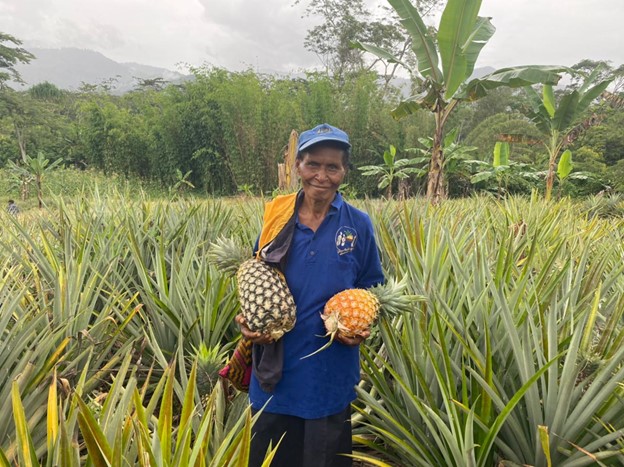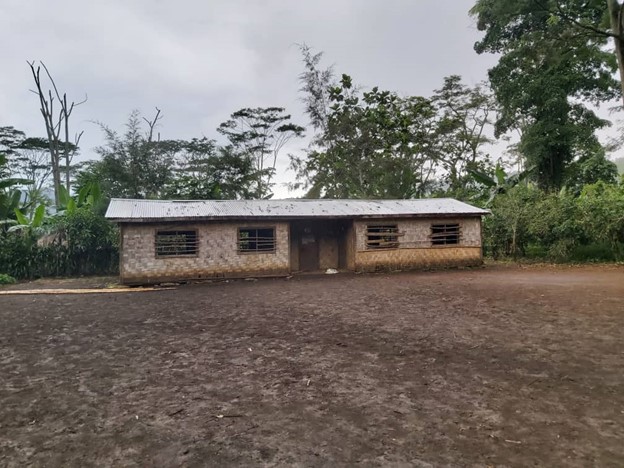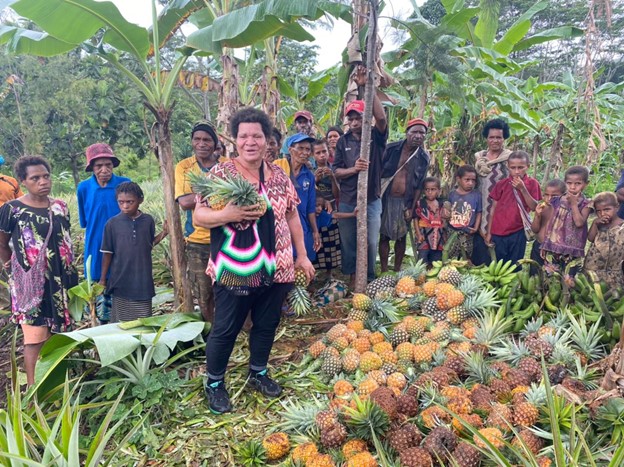Rum is a small village located in the rugged parts of Kompiam District, on the northern edge of Enga Province in Papua New Guinea. Rum village is not as cold as the rest of Enga because it is near the borders of Madang and East Sepik provinces. In spite of the two-hour drive from Wabag town on the deteriorating road, and an hour walk down a steep mountain, the journey was worth it after tasting the pineapples from Rum village. However, this story is not just about pineapples, which I must say, are sweet, juicy, and the best we’ve had so far.
The trip to Rum village was inspired after hearing the story of the ‘Pineapple Lady’ who built an elementary school from selling pineapples. Pineapple Lady Pepam Piyu faces many challenges with her journey to sell her pineapples at the town market. The trip to Pepam’s pineapple garden gave a glimpse of her struggles.

Pepam Piyu is a mother of one and a grandmother to four in Rum village. Despite not having the opportunity of a proper education, Pepam strongly believed that education was the way forward. Seeing the desperate need for basic services such as proper roads, schools and health facility in her community, she decided to do something to help.
When asked what inspired her to build a school, Pepam simply responded, “ol man save skul, em divelopmen kam, sapos nogat, em nogat divelopmen nau (if people are educated, there’s development, but if not, there’s no development).”
Pepam started her pineapple garden in 2005, and with help from her village, the pineapples were brought to Kompiam station to sell. The process of transporting the pineapples was Pepam’s biggest struggle, as it takes about two days to bring her harvest to the station by foot. As the village is in a valley, Pepam pays K10 for a bag of pineapple to be carried up a steep mountain to the main road, which are then brought to the station. Unfortunately, most of the pineapples do not make it to the market.
Regardless of the painful journey, Pepam pushed on, using the funds raised to build the Pineapple Elementary School in 2006, and a small church, which serves as an adult literacy hub. She has also supported the school with stationary supplies when she can. These establishments have brought hope to Rum village, and this has encouraged the community to live in peace. The community do not want tribal fighting, and want to live in a peaceful community.

Pepam has expanded her pineapple garden and now her pineapples are sold in Wabag town with support from Margaret Potane and the network of women from the Kompiam Women’s Agri in Business. There is no network coverage in the area, but Pepam doesn’t let anything stop her. She climbs a particular tree on the mountain to get mobile reception, and sends a ‘please call me’ message to Margaret. Margaret knows the pineapples are ready for pickup when she receives the message, and sends drivers to assist Pepam with transportation to Wabag town market.
Margaret was emotional when sharing Pepam’s struggles of bringing her pineapples to market. In addition to the K10 a bag that Pepam pays the young men carry the load up the mountain, a seat on a PMV (bus) for the pineapple bags costs K20, and a seat for herself is another K20.
“So really, what will she gain from her labor? It’s useless and pointless, and most times a lot of pineapples get rotten and are wasted,” said Margaret.

Margaret and the community at Rum village were very grateful for the visit. It was the first time they have had outsiders visit their village to see and experience the challenges, and hopefully find ways to help. The team accompanied by Margaret to visit Rum village included BSP Head of Support Services Alicia Sahib, Bel isi Program Manager Danielle Winfrey, Femili PNG CEO Daisy Plana with Communications Officer Jonica Jay.
Alicia thanked the community for the warm welcome. She had learnt about Pepam and her work from Margaret, and shared with the team to visit and see how she and others can help. Alicia said, “hopefully we all women can come and help you. But we need women and men, boys and girls to work together, because you’re one family.” She concluded, “if you fight, nothing will work. We can only help you, if you help yourself.“
Pepam shares the same sentiments as many of the parents in her village. They hope to see basic services reaching their community, and a better future for their children. For now, the school needs basic materials such as tables, chairs, books and stationaries. Margaret, who is the Provincial Director for Commerce, Culture and Tourism, and leads in a number of other responsibilities, continues to help Pepam and the women associations in Enga province. Under the leadership of Governor Peter Ipatas, she has been able to assist many women in the five districts under the Enga Women Micro Finance in the province. Like Pepam, many of these women are faced with their own challenges.
Femili PNG’s presence in Enga province was through the support of the EU-UN Spotlight Initiative to provide training to service providers on family and sexual violence and its related laws.


